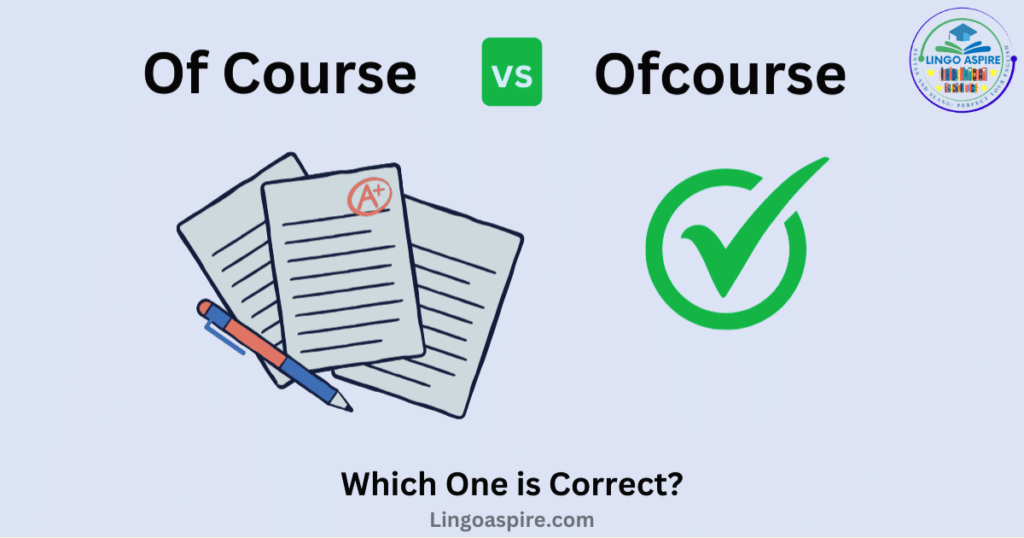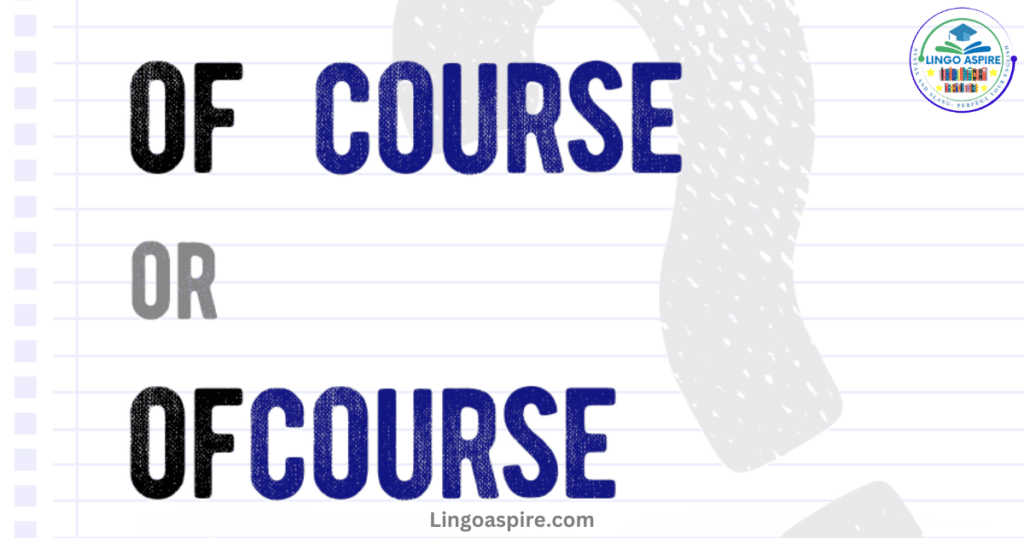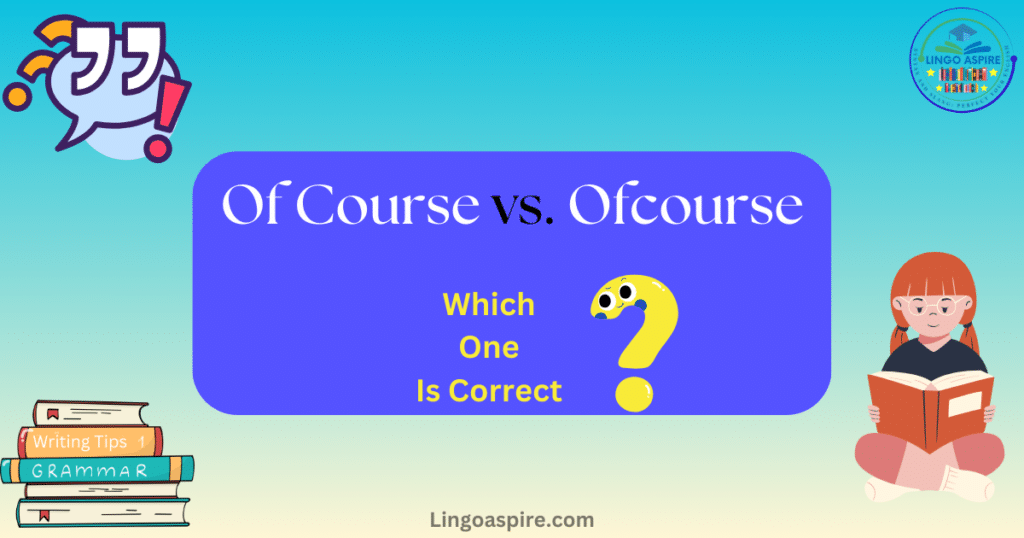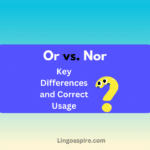When writing in English, precision matters. One of the common mistakes people make is misusing compound words like of course vs. ofcourse. Many are unsure of which version to use, which can lead to confusion. Understanding the difference between these two phrases will improve your writing accuracy and help you communicate clearly. In this post, we’ll dive into the details of proper writing, highlight the correct phrase, and clear up any misunderstandings surrounding language use.
Understanding Of Course vs. Ofcourse

At first glance, “Of course” and “Ofcourse” may seem interchangeable, but they are not. “Of course” is the correct phrase, while “Ofcourse” is simply a misspelling. In standard English, compound words are often tricky, and knowing when to use two separate words instead of a single, combined word is key to accurate expression. “Of course” is an English phrase that is widely used to indicate agreement, affirmation, or to introduce an obvious statement.
For example, in casual conversation or in written form, when someone says, “Can you help me with this task?” a typical response would be, “Sure, of course!” The phrase expresses certainty or an easy agreement. On the other hand, “Ofcourse” is not recognized in formal English and should be avoided in both writing and speech. Using “of course” correctly shows attention to detail and proper wording, making your communication more effective and polished.
Why the Confusion Exists of of course vs. ofcourse
The confusion between of course vs. ofcourse likely stems from the way compound words evolve in English. Many people mistakenly blend two words because it sounds natural in everyday language. However, proper writing demands a clear distinction between words that should stay separate and those that naturally form a single word. English is full of compound words that may or may not require a hyphen, or remain two separate words altogether.
The trend of blending words into one is also influenced by informal writing, where the rules tend to be looser. In informal communication, such as in online conversations or everyday speech, it’s easy to mix up these terms. Yet, when it comes to academic English or professional writing, maintaining correct terminology and using the proper phrase is crucial to effective communication.
The Correct Usage: “Of Course”
“Of course” is used to convey a sense of certainty, agreement, or an obvious answer. It’s common in both casual writing and more polished writing. The correct phrase can be used in a variety of situations, whether you’re agreeing with a statement or emphasizing a point.
In proper writing, it’s important to separate “of” and “course” when you intend to express affirmation or clarity. For instance, “He asked if he could borrow my book, and I said, of course.” This shows both precise wording and a natural flow in language use. Similarly, in formal communication, saying “Of course, I’ll attend the meeting,” sounds more professional and polished compared to any incorrect alternatives.
If you’re aiming for clear writing, make sure you use “of course” in the proper context. This phrase is not just an everyday expression but also plays an important role in emphasizing points. It’s about conveying confidence and certainty in your communication. For example, instead of writing, “He will surely do it,” a stronger sentence would be, “He will do it, of course.”
“Ofcourse” and Other Incorrect Variations
Though it’s tempting to blend the words, “ofcourse” is simply a misspelling of “of course.” Blended words like this can cause misunderstandings in academic English or professional writing, as they stray from standard English. The compound structure of “of course” requires the words to remain distinct to preserve their intended meaning and function.
Another common error related to “ofcourse” is the confusion between “off course” and “of course.” The phrase “off course” refers to something going astray or being out of alignment, such as a ship being off course in navigation. This can lead to confusion when spoken or written. Therefore, it’s essential to know when to use “of course” and avoid blending it into one word.
Uses of Of Course vs. Ofcourse
The correct usage of “of course” vs. “ofcourse” comes down to spelling conventions in standard English. “Of course” is the correct phrase, and it is used to express agreement, affirmation, or an obvious statement. “Ofcourse,” however, is a misspelling and should be avoided in professional writing, as it is not recognized in any formal or informal contexts. Below, I will break down the uses of each, with a focus on the proper usage of “of course” and why “ofcourse” is incorrect.
| Usage | “Of Course” | “Ofcourse” |
|---|---|---|
| Meaning | Used to express certainty, agreement, or affirmation. | A misspelling of “of course” that doesn’t exist in standard English. |
| Correctness | Correct in all contexts—formal, informal, spoken, and written. | Incorrect—avoid using “ofcourse” in writing. |
| Examples | “Can you help me with this?” “Yes, of course!” | Should not be used in writing or speech. |
| Common Contexts | Everyday speech, academic writing, professional communication. | None—incorrect in all contexts. |
| Formality | Can be used in both formal and informal contexts. | Never used in formal writing or professional communication. |
| Clarity and Precision | Provides clear and precise wording, ensuring clarity in communication. | Causes confusion and should be avoided to maintain writing accuracy. |
As you can see, “of course” is versatile and used in both formal and informal contexts, while “ofcourse” is simply a blunder that should be avoided. To maintain clarity and precise writing, always use “of course” as it ensures proper wording and avoids unnecessary misspellings.
Synonyms and Alternatives to “Of Course”
While “of course” is a useful phrase, there are several synonyms and alternatives that can add variety to your writing. For instance, “certainly”, “absolutely”, “naturally”, and “sure” can all be used in place of “of course” depending on the tone and context. These alternatives help to maintain precise writing and can prevent repetition in your work.
If you’re aiming for a colloquial tone or informal writing, “of course” may sound too formal. In such cases, a more relaxed communication approach might include using “sure” or “yeah”. However, it’s important to note that these should only be used in the right setting, such as casual everyday speech or informal writing.
Common Mistakes and How to Avoid Them

One of the most frequent errors people make is using “ofcourse” instead of “of course.” This simple misspelling can have a major impact on your writing accuracy. Another common mistake is using phrases like “offcourse” or “off course,” which have entirely different meanings. These are not interchangeable with “of course” and can confuse readers, especially in professional contexts.
To ensure proper writing, double-check for these common mistakes and correct them. Proofreading is essential to ensure that your communication remains clear and accurate. Understanding the difference between “of course” and other similar expressions will help you avoid misunderstandings and improve your writing accuracy. When you’re confident in your use of these terms, your writing will become more polished and professional.
Origins and Historical Context of “Of Course”
The phrase “of course” has been part of the English language for centuries. Originally, it was used to indicate something well-known or widely accepted. Over time, it evolved into a common expression used to convey agreement, certainty, or ease. This is why “of course” remains a staple in everyday language and informal writing.
The history of “of course” is tied to the development of compound words in English. As English speakers started linking words together for ease of communication, phrases like “of course” began to take on more specialized meanings. This historical background helps explain why “ofcourse” is not accepted in standard English. It’s a case of blended words being used incorrectly, and understanding this context ensures more precise writing in modern times.
Conclusion
In conclusion, while of course vs. ofcourse may seem similar, they are not interchangeable. The correct phrase is “of course”, and using it properly enhances your writing accuracy and ensures clear communication. By avoiding the misspelling of “ofcourse”, you can improve polished communication in both professional and personal writing.
When you use “of course” correctly, it emphasizes points, creates more confident communication, and reflects your attention to proper language use. So, always remember to check for common mistakes, and make sure you’re using the correct phrase. With practice, you’ll master the use of “of course” and elevate your clear writing to the next level.
Sources
Here are three reliable sources that support the correct use of “of course” and the avoidance of “ofcourse” in writing:
- Merriam-Webster Dictionary: The dictionary defines “of course” as a phrase used to express agreement or affirmation. It provides no listing for “ofcourse,” confirming it as a misspelling.
- Oxford English Dictionary: The OED lists “of course” as a standard phrase, frequently used in both formal and informal contexts. It does not recognize “ofcourse” as a correct or standard form.
- Grammarly: Grammarly’s blog on common grammar mistakes explicitly warns against blending words like “of course” into incorrect forms like “ofcourse.” It reinforces the importance of correct spelling for clear and professional communication.







